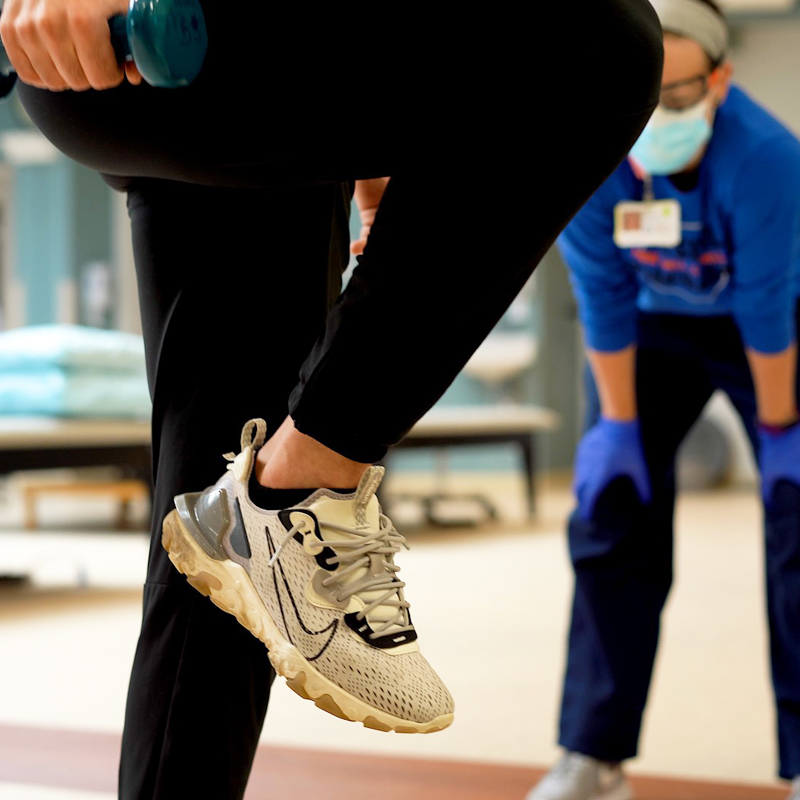Brick, NJ, Grandmother Loses 100 Lbs. With Bariatric Revision

November 10, 2023
Dawn Wicks struggled with her weight since childhood. After years of unsuccessful diets, the now-54-year-old underwent gastric sleeve surgery—which reduced the size of her stomach—in 2013. That helped her lose some weight, but over time, the pounds started creeping back.
“My highest weight ever was 254 pounds. I got down to 165 with the sleeve and then just couldn't maintain it,” says Dawn, a telemetry monitor technician at Jersey Shore University Medical Center. “Between being in perimenopause and working nights, I just kept gaining and gaining. I was sleeping all the time and miserable.”
On top of that, Dawn was suffering from severe acid reflux, a side effect of the sleeve. “I would get a burning feeling in my throat and then nausea,” she says. “I felt like I was on fire. It was horrible.”
When a colleague told her about bariatric revision, Dawn wondered if she would be a candidate. She made an appointment with Seth Kipnis, M.D., medical director of bariatric and robotic surgery at Jersey Shore, to find out.
Bariatric Revision Surgery: A Second Chance
Bariatric revision surgery is a procedure that corrects or changes a previous weight-loss surgery in cases where a patient is experiencing complications or not getting the results they’d hoped for.
“I think of it like heart disease,” says Dr. Kipnis. “Sometimes we put a few stents in someone when they're having a heart attack, and those last for a few years. But sometimes, they need open heart surgery.”
In Dawn’s case, converting her sleeve to a gastric bypass could help her with weight loss as well as her reflux. “Dawn had the most to benefit because when you do a gastric bypass, you take the acid-producing portion of the stomach and disconnect it from the esophagus,” explains Dr. Kipnis.
After going through the necessary screening tests and assessments, Dawn had bariatric revision with a gastric bypass in the summer of 2021. Dr. Kipnis performed the procedure robotically, resulting in smaller incisions, less pain and faster recovery compared to traditional surgery.
The robot is particularly helpful in the case of a revision. “Revisional surgery is a little more involved,” Dr. Kipnis says. “There are staples and scar tissue from prior surgeries in the regions we're operating on that may be quite stuck. Robotic surgery can help with that.”
Dawn stayed in the hospital for two nights after her surgery before returning home. Recovery was a little rough, she admits. But a few weeks later, she was swimming in her backyard pool with her two grandkids.
Embracing Change
Two years after her surgery, Dawn has lost about 41 percent of her body weight and dropped from a size 22 to a size 4/6. “I’ve lost about 100 pounds and have been maintaining that for the past year. I feel so good,” she says.
She also no longer suffers from reflux, her asthma has improved, and she has a lot more energy. “My grandchildren are 5 and 7 years old, and I can definitely keep up with them a lot more now,” Dawn says.
Weight-loss surgery isn't a quick fix and requires long-term lifestyle changes to be successful— something that Dawn has fully embraced. She sees surgery as a useful tool alongside her healthy habits, such as biking with her husband, doing squats and wall push-ups, and weighing and tracking her food.
Friends, family, and colleagues have all watched Dawn’s incredible transformation over the past two years. Not surprisingly, she’s received a lot of questions, which she’s always happy to answer.
“I feel like a salesperson for weight-loss surgery, but I'm just so happy with how I am,” Dawn says.
Next Steps & Resources:
- Meet our source: Seth Kipnis, M.D.
- To make an appointment with a bariatric surgeon near you, call 800-8220-8905 or visit our website.
- Find out if you’re a candidate for weight-loss surgery by taking our health risk assessment.
The material provided through HealthU is intended to be used as general information only and should not replace the advice of your physician. Always consult your physician for individual care.





